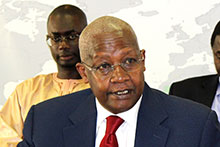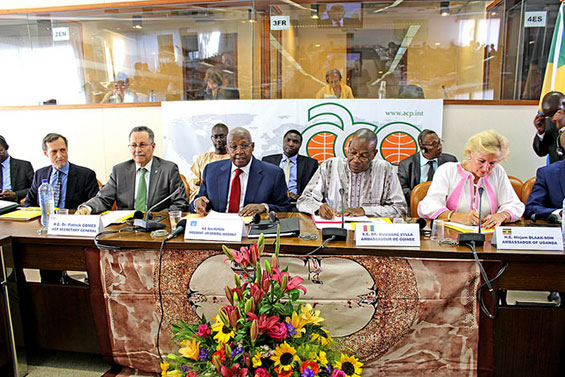UNGA Chair calls for more economic competitiveness, transformation at ACP 40th anniversary
 Brussels, 6 June 2015/ ACP: High level speakers at a two-day conference marking the 40th year of the African, Caribbean and Pacific Group of States, called for economic transformation across the 79 ACP member countries as well as sharper strategies to become more competitive as a Group in the 21st century.
Brussels, 6 June 2015/ ACP: High level speakers at a two-day conference marking the 40th year of the African, Caribbean and Pacific Group of States, called for economic transformation across the 79 ACP member countries as well as sharper strategies to become more competitive as a Group in the 21st century.
The keynote presentation by the President of the United Nations General Assembly H.E. Mr. Samuel Kutesa, stressed that in order to remain an influential actor in the “new global order”, the ACP Group must focus on improving competitiveness and strengthening representation in global governance structures.
“It is inadequate that [the ACP] Group with a combined population of 900 million people contributes less than 5% of world trade and only 1.9% of global GDP. By contrast, the EU, with a population of about 500 million people, contributes over 16% of global trade and 17% of global GDP,” Mr. Kutesa told participants, emphasising the need to diversify economies and reduce commodity dependence.
“Collectively, and with the support of development partners, ACP countries need to address infrastructural deficits, especially in energy and transport, which constrain industrialisation and value addition to their commodities and natural resources,” he added.
The 40th anniversary symposium (see Videos + Photos), held on 4-5 June under the theme “From Georgetown to Sipopo,” covered major issues of concern for the organisation, including regional integration, international trade and the ACP’s Economic Partnership Agreements with the EU; strategic partnerships; and the future prospects of the ACP as a Group, taking into account its development since its inception under the 1975 Georgetown Agreement, to the 7th Summit of ACP Heads of State and Government in 2012. The 7th Summit generated the Sipopo Declaration, reaffirming the political will amongst members to remain united as a group while reforming itself to be more effective in achieving its goals of poverty eradication and sustainable development in member countries.
Amongst the panellists at the symposium were President of the Economic Community of West African States (ECOWAS) H.E. Mr. Kadré Ouédraogo as well as representatives of other regional bodies across the ACP, Minister of External Relations and Cooperation of Comoros H.E Abdoulkarim Mohamed, the Ambassadors of Turkey, Brazil and India in Brussels, Deputy Chair of G7+ International and Deputy Minister of Planning of Haiti H.E. Michel Presumé, as well as academics such as Director the Institute for Global Dialogue Dr. Siphamandla Zondi and experts from the South Center in Geneva.
“In the ACP, we intend to carve a path that is quite strategic in where we can make the most impact. But we have to rely, very clearly, on various types of partnerships. At the broad level, the ACP Group must have a voice in the global arena and the United Nations, and we too want to see the complementarity with our regional organisations,” stated the ACP Secretary General Dr. Patrick Gomes.
Financing the Post-2015 development agenda
In this context, the meeting discussed how the ACP Group could consolidate its input to discussions on the global development framework to replace the Millennium Development Goals.
“This is truly a momentous year,” stated Mr. Kutesa. “We are currently engaged in three interlinked processes that will define our collective development path for the next 15 years and beyond.”
He said the post-2015 development agenda to be adopted by world leaders in September in New York must be “ambitious transformative and transforms economies, improves people’s livelihoods, and protects our planet.”
To do so requires the successful outcome of the Third International Conference on Financing for Development to be held in July in Addis Ababa, including action oriented deliverables to support the implementation of the development agenda. Success in Addis Ababa would also boost the chances of delivering a binding international agreement on climate change in Paris in December.
The ACP Group was encouraged to engage intensely in these debates. An ACP position on financing for development is currently being finalised by the Committee of Ambassadors, which calls for a bold financing framework to adequately handle issues and challenges. Generally, the ACP urges increased support for mobilising domestic resources; better targeting of Official Development Assistance (ODA) based on needs; increasing private funding to finance investment; and improving public debt management in developing countries.
The President of the UN General Assembly agreed to work closely together with the ACP Secretary General to make the ACP Group positions more visible in the United Nations fora. Collaboration was also welcomed by representatives of regional organisations, the European Commission, and emerging economies and global players present at the event.
– ACP Press
(Photo below: UN General Assembly President H.E. Mr. Samuel Kutesa (centre) addresses participants at the ACP Group's 40th anniversary commemoration in Brussels.)

